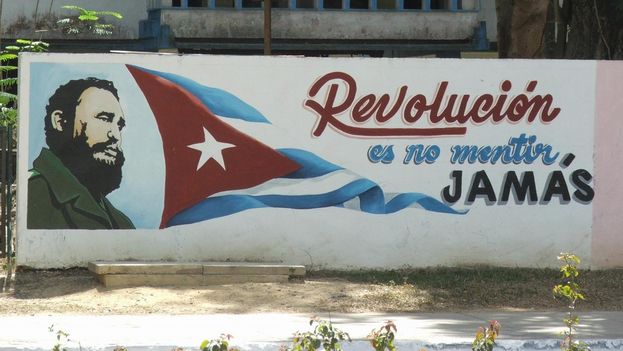
![]() 14ymedio, Carlos Alberto Montaner, Miami, 2 January 2016 — The Castros have been in power for 57 years. At this point, general curiosity is limited to formulating three disturbing questions. Why have they lasted so long? Is it a failure, as their opponents say, or a success, as their supporters claim? What will happen after this extremely long-lasting government, the longest in the history of the Americas?
14ymedio, Carlos Alberto Montaner, Miami, 2 January 2016 — The Castros have been in power for 57 years. At this point, general curiosity is limited to formulating three disturbing questions. Why have they lasted so long? Is it a failure, as their opponents say, or a success, as their supporters claim? What will happen after this extremely long-lasting government, the longest in the history of the Americas?
The Castros’ government has been so enduring because it is a dictatorship that does not seek the consent of society, nor does it dedicate itself to obeying it. On the contrary, its efforts are permanently dedicated to directing and controlling it.
The secret of this permanence is to convert people into sheep and to conveniently keep them penned up. To these ends a formidable apparatus of counterintelligence is organized, with some 60,000 people and a proven repressive script. That amounts to 0.5% of the population, consistent with the infallible formula learned from the German Stasi which, along with the KGB, was the mother and teacher of the Cuban services.
The other similar regime in the world, North Korea, is also a military dynasty and has continued for 68 years. The father of that orchestrated anthill of rhythmic gymnasts was Kim Il-Sung. He started in 1948 and died, in power, in 1994, but not before bequeathing to museums the chairs where he had placed his egregious buttocks. He was then followed by his son Kim Jong-il, and his grandson Kim Jong-un.
North Korean security troops exceed 106,000 members, to control 24 million survivors. More than twice the Cuban population. That police apparatus, which doesn’t do things by halves, has created a system of political castes called Songbun, dividing people into three groups: loyals, waverers, and hostiles. The loyals serve as auxiliaries to counterintelligence in the harassment and surveillance of the other two sectors. It is no wonder that when Fidel Castro visited North Korea, according to those who accompanied him, he was fascinated with the experiment. It seemed like a model country.
Has the Castro regime triumphed or failed? If measured by the ability to cling to power, it has undoubtedly triumphed. Raul Castro was the Minister of Defense at age 28, he is now 85 and has never ridden in anything but good official cars and never ceased to live lavishly with the royal family. For him and for his group of minions, it has been a success.
If measured by the influence achieved by the regime, the conclusion is the same. Venezuela has become a generous colony, meticulously exploited, and political operatives trained by Cuban intelligence services control or influence a dozen unfortunate Latin American countries, to the extent that the Colombian peace process is being irresponsibly negotiated in Havana.
But if what we take into account is the overall prosperity of the country and the degree of genuine happiness shared by the whole population, it has been a resounding failure. Across three generations Cubans have suffered thousands of executions, tens of thousand of political prisoners incarcerated, millions of people exiled, and the government has erected the most unproductive model of wealth creation in history, while meticulously demolishing the material structure it inherited. It is “the art of making ruins” at its finest.
In 57 years of absolute control of power, the Castros have aggravated to the point of martyrdom key elements of daily life: food and access to drinking water, housing, transportation, communications, electricity, shoes and clothing. From this grim landscape escape, as always, the thousands of Cubans currently stranded in Costa Rica, compassionately cared for by the government and people of that exemplary country.
These dire results are not, in reality, products of evil, but of ignorance, the ambition of power and the revolutionary arrogance emanating from Marxist certainties. They were willing to kill and do harm to remain in power and forced Cubans to live according to the utopia they lodged in their feverish brains. And so they have devastated the country.
What will happen in the future? Nothing substantial. As long as the Castros and their clique do not retire from public life, and as long as their system – today transformed into military state capitalism – remains standing, the country will continue to be condemned to the massive emigration of desperate Cubans and the most radical lack of productivity.
The basic problem lies in perceptions and in the confidence that emanates from them. It does not matter if the United States ends the embargo or substantially increases the number of tourists. It doesn’t matter if President Obama visits Cuba, like the last three popes, and gives a speech in favor of freedom.
Cubans, as a general rule, do not believe in the system. They do not believe in their compatriots. They do not believe in the destiny of their country. They do not believe in those who lead them, and much less in the capabilities of that sleepy and grim bureaucracy that imperturbably continues to practice centralized planning. All this will begin to change after the Castro regime is buried. Never before.
